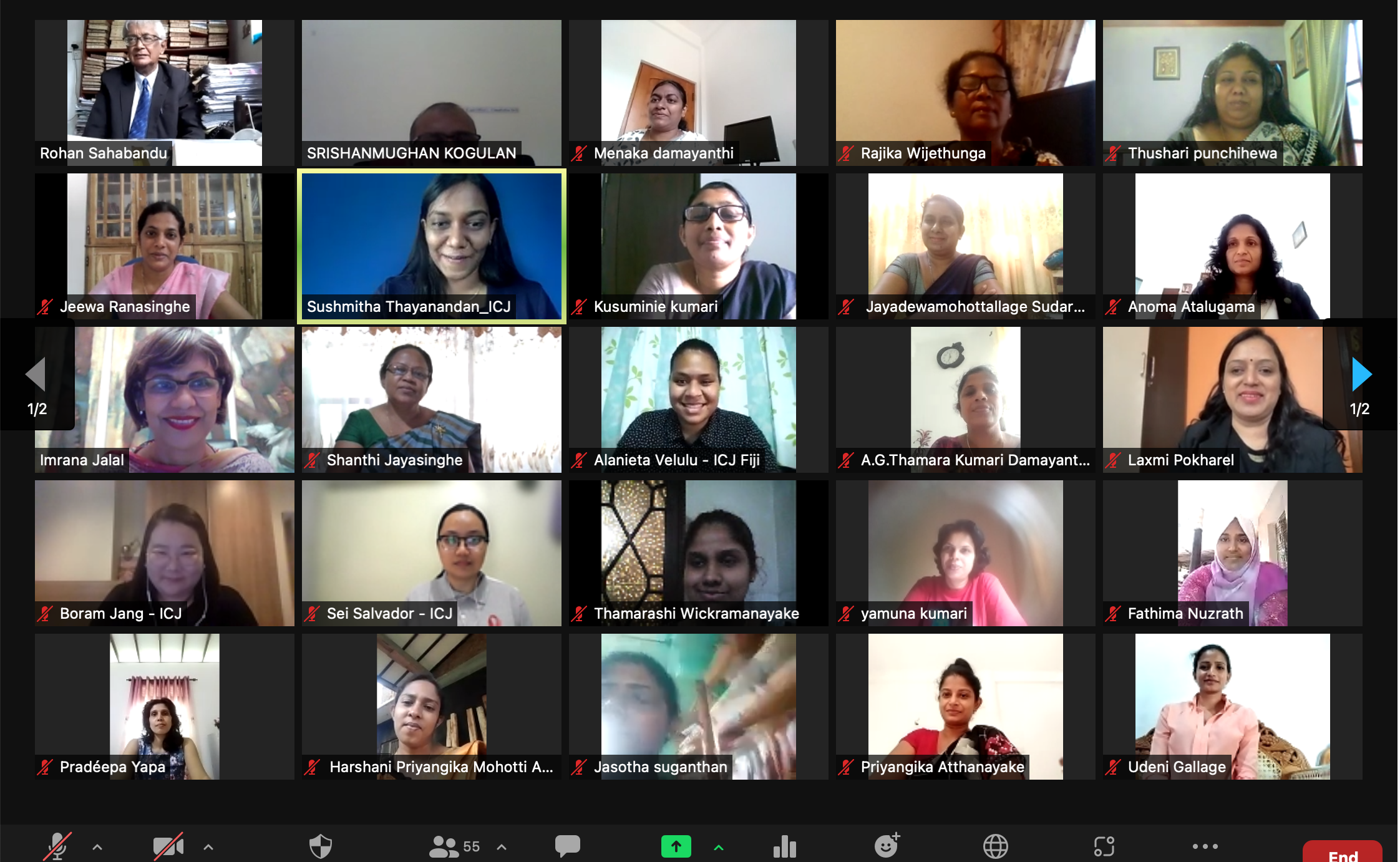The Sri Lankan judiciary must overcome gender stereotypes to improve women’s access to justice in the country, said participants at a workshop organized by the ICJ and the Legal Aid Commission of Sri Lanka on 30 and 31 of October.
The webinar series on “Eliminating Gender Discriminatory Attitudes and Behaviours Towards Women and Enhancing Access to Justice for Women” brought together 44 legal professionals attached to the Legal Aid Commission of Sri Lanka. The primary objective of the workshop was to assist these legal aid providers in their efforts to identify gender discriminatory practices in the Sri Lankan justice system in order to improve access to justice for women.
Chairman of the Legal Aid Commission, President’s Counsel Rohan Sahabandu stated that while Sri Lankan largely provided for gender equality in laws, this did not always translate in practice due to indirect and compound forms of discrimination. He added that even though Sri Lanka ratified the CEDAW in 1981, justice actors remain unaware of the developments including of comparative jurisprudence that have made use of CEDAW, meaning thatawareness programmes such as the webinar were much needed.
ICJ Commissioner Imrana Jalal, facilitated a session on the CEDAW core principles of equality, non-discrimination and State obligations, linking it with the fundamental rights guaranteed by the Sri Lankan Constitution. She also discussed the role that lawyers should play on domesticating CEDAW as well as eliminating gender stereotypes and discriminatory behaviours. Ms. Jalal also spoke directly on women’s access to justice under international law. In reaction, the Chairman of the Commission, who acknowledged that the issue of corroboration remains a discriminatory aspect of Sri Lankan criminal law, assured that the Legal Aid Commission would write to the Ministry of Justice with regards to the reformation of this aspect of the law.
Judge Amy Avellano, Regional Trial Court Judge from the Philippines discussed with the participants how gender inequality is built on gender norms, gender roles and unequal gender relations. The session highlighted that gender inequality is sustained through the perpetuation of gender stereotypes and the need for justice actors to ac to eliminate them.
Hina Jilani, a prominent global human rights defender and ICJ Commissioner from Pakistan, spoke to the legal officers about her own experience in setting up Pakistan’s first all-female legal aid practice, AGHS Legal Aid Cell (ALAC). She explained [that maximizing the the role of women in facilitating access justice require… how legal aid providers can maximize the role they play in facilitating women’s access to justice.
These sessions were followed by a panel discussion on the importance of Legal Aid in enhancing women’s access to justice in Sri Lanka. Ms. Thamarashi Wickramanayake, Senior Legal Aid Officer of the Legal Aid Commission, Ms. Ramani Jayasundare, Director Gender Justice of the Asia Foundation, Ms. Mariam Wadood, Legal and Project Manager of Women in Need and Ms. Swasthika Arulingam Attorney-at-Law and Women’s Rights Activist spoke on the role of the Legal Aid Commission in enhancing women’s access to justice and how other actors such as NGOs play a vital role in this regard.
The webinar series was organized under the ‘Enhancing Access to Justice for Women in Asia and the Pacific’ project funded by the Swedish International Development Cooperation Agency (SIDA). Due to the COVID–19 pandemic, the workshop was conducted virtually via Zoom. Simultaneous translation from English to Tamil and Sinhala languages were available in the workshop.
Contact
Osama Motiwala, ICJ Asia-Pacific Communications Officer, t: +66-62-702-6369 e: osama.motiwala(a)icj.org





